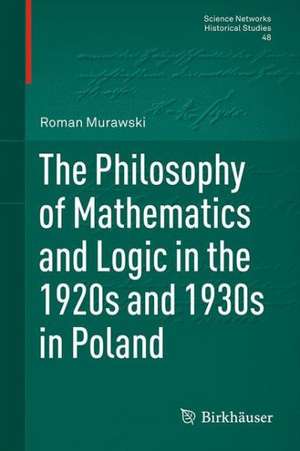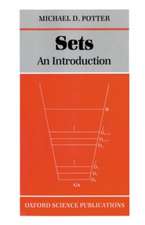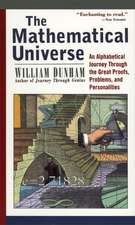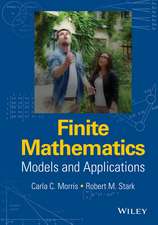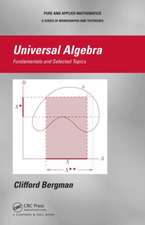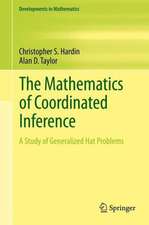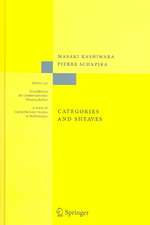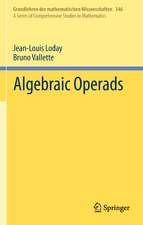The Philosophy of Mathematics and Logic in the 1920s and 1930s in Poland: Science Networks. Historical Studies, cartea 48
Autor Roman Murawski Traducere de Maria Kantoren Limba Engleză Hardback – 8 sep 2014
Din seria Science Networks. Historical Studies
- 18%
 Preț: 796.31 lei
Preț: 796.31 lei - 15%
 Preț: 652.49 lei
Preț: 652.49 lei - 18%
 Preț: 787.15 lei
Preț: 787.15 lei -
 Preț: 385.25 lei
Preț: 385.25 lei -
 Preț: 489.30 lei
Preț: 489.30 lei - 15%
 Preț: 476.75 lei
Preț: 476.75 lei -
 Preț: 389.31 lei
Preț: 389.31 lei - 15%
 Preț: 699.59 lei
Preț: 699.59 lei - 15%
 Preț: 660.37 lei
Preț: 660.37 lei - 15%
 Preț: 531.59 lei
Preț: 531.59 lei - 24%
 Preț: 909.27 lei
Preț: 909.27 lei -
 Preț: 396.24 lei
Preț: 396.24 lei - 18%
 Preț: 903.17 lei
Preț: 903.17 lei -
 Preț: 382.36 lei
Preț: 382.36 lei -
 Preț: 395.25 lei
Preț: 395.25 lei - 15%
 Preț: 647.73 lei
Preț: 647.73 lei - 15%
 Preț: 702.87 lei
Preț: 702.87 lei - 15%
 Preț: 674.74 lei
Preț: 674.74 lei - 15%
 Preț: 655.60 lei
Preț: 655.60 lei - 15%
 Preț: 650.19 lei
Preț: 650.19 lei - 15%
 Preț: 644.82 lei
Preț: 644.82 lei - 15%
 Preț: 646.62 lei
Preț: 646.62 lei - 18%
 Preț: 1119.08 lei
Preț: 1119.08 lei - 18%
 Preț: 1135.46 lei
Preț: 1135.46 lei - 20%
 Preț: 595.48 lei
Preț: 595.48 lei - 20%
 Preț: 596.59 lei
Preț: 596.59 lei - 15%
 Preț: 649.06 lei
Preț: 649.06 lei - 20%
 Preț: 567.63 lei
Preț: 567.63 lei - 15%
 Preț: 639.37 lei
Preț: 639.37 lei -
 Preț: 399.12 lei
Preț: 399.12 lei - 18%
 Preț: 1390.11 lei
Preț: 1390.11 lei -
 Preț: 361.03 lei
Preț: 361.03 lei - 18%
 Preț: 1395.63 lei
Preț: 1395.63 lei - 15%
 Preț: 642.36 lei
Preț: 642.36 lei - 15%
 Preț: 648.24 lei
Preț: 648.24 lei - 15%
 Preț: 649.06 lei
Preț: 649.06 lei
Preț: 392.37 lei
Nou
Puncte Express: 589
Preț estimativ în valută:
75.09€ • 78.11$ • 61.99£
75.09€ • 78.11$ • 61.99£
Carte tipărită la comandă
Livrare economică 14-28 aprilie
Preluare comenzi: 021 569.72.76
Specificații
ISBN-13: 9783034808309
ISBN-10: 3034808305
Pagini: 300
Ilustrații: XI, 228 p.
Dimensiuni: 155 x 235 x 20 mm
Greutate: 0.52 kg
Ediția:2014
Editura: Springer
Colecția Birkhäuser
Seria Science Networks. Historical Studies
Locul publicării:Basel, Switzerland
ISBN-10: 3034808305
Pagini: 300
Ilustrații: XI, 228 p.
Dimensiuni: 155 x 235 x 20 mm
Greutate: 0.52 kg
Ediția:2014
Editura: Springer
Colecția Birkhäuser
Seria Science Networks. Historical Studies
Locul publicării:Basel, Switzerland
Public țintă
ResearchCuprins
Introduction.- Predecessors.- The Polish School of Mathematics.- Lvov-Warsaw School of Philosophy.- Benedykt Bornstein.- Cracow Centre.- Conclusion.- Biographical Notes.- Bibliography.- Index of Names.
Recenzii
“The book of Roman Murawski provides a valuable source of information on the most important scholars and their main achievements. … This book is indispensable for anyone interested in the history of Polish mathematics and philosophy, as well as those who are interested in the general tradition of analytic thought in Europe.” (Andrzej Indrzejczak, zbMATH 1329.00127, 2016)
“Roman Murawski’s book is a good way to learn about the general Polish influence on these disciplines.” (James T. Smith, History and Philosophy of Logic, Vol. 37 (2), August, 2015)
“Roman Murawski’s book is a good way to learn about the general Polish influence on these disciplines.” (James T. Smith, History and Philosophy of Logic, Vol. 37 (2), August, 2015)
Textul de pe ultima copertă
The aim of this book is to present and analyze philosophical conceptions concerning mathematics and logic as formulated by Polish logicians, mathematicians and philosophers in the 1920s and 1930s. It was a remarkable period in the history of Polish science, in particular in the history of Polish logic and mathematics. Therefore, it is justified to ask whether and to what extent the development of logic and mathematics was accompanied by a philosophical reflection. We try to answer those questions by analyzing both works of Polish logicians and mathematicians who have a philosophical temperament as well as their research practice. Works and philosophical views of the following Polish scientists will be analyzed: Wacław Sierpiński, Zygmunt Janiszewski, Stefan Mazurkiewicz, Stefan Banach Hugo Steinhaus, Eustachy Żylińsk and Leon Chwistek, Jan Łukasiewicz, Zygmunt Zawirski, Stanisław Leśniewski, Tadeusz Kotarbiński, Kazimierz Ajdukiewicz, Alfred Tarski, Andrzej Mostowski and Henryk Mehlberg, Jan Sleszyński, Stanisław Zaremba and Witold Wilkosz. To indicate the background of scientists being active in the 1920s and 1930s we consider in Chapter 1 some predecessors, in particular: Jan Śniadecki, Józef Maria Hoene-Wroński, Samuel Dickstein and Edward Stamm.
Caracteristici
The book provides complete analysis of philosophical views of leading logicians and mathematicians in Poland in the 1920s and 1930s The book shows the background of the remarkable development of mathematics and logic as well as philosophy (in particular analytic philosophy) in Poland at that time It is based on the analysis of papers and books by Polish logicians, mathematicians and philosophers There are no competing titles in the area Includes supplementary material: sn.pub/extras
